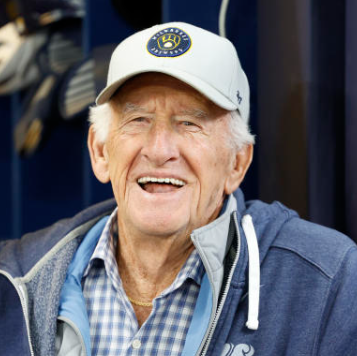Bob Uecker’s passing marks the end of an era, but his spirit lives on in the hearts of those who loved him
From his early days as a major league catcher to his decades-long career as a broadcaster, Uecker’s journey was one of passion, humor, and dedication.
As fans, players, and colleagues reflect on his life, they’re reminded of the countless memories he created and the joy he brought to the game. Bob Uecker may be gone, but his legacy as “Mr. Baseball” will live on forever.
Bob Uecker’s playing career may not have earned him a place in the Hall of Fame, but his contributions to baseball and entertainment have made him a legend in his own right.
From his humble beginnings as a backup catcher to his celebrated career as “Mr. Baseball,” Uecker’s story is one of perseverance, humor, and an unwavering love for the game.
In the end, Bob Uecker’s peculiar playing career is a testament to the idea that sometimes, the most remarkable journeys come from the most unlikely beginnings.
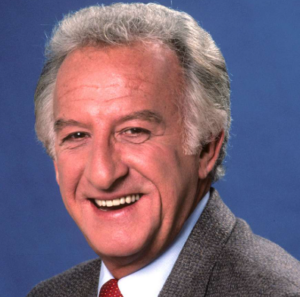
Also Read: Paige Bueckers Reacts to Chet Holmgren’s Insane Catch-and-Shoot Buzzer-Beater
Table of Contents
Bob Uecker: Legacy
A Life Dedicated to Baseball and Broadcasting
The baseball world mourned the loss of Bob Uecker, the legendary Milwaukee Brewers announcer, who passed away on Thursday at the age of 90.1
Uecker, who had been the voice of the Brewers for over five decades, left an indelible mark on the sport with his humor, warmth, and unmistakable voice.
Willy Adames, the San Francisco Giants’ new shortstop and a former Milwaukee Brewer, expressed his grief through a heartfelt tribute on Instagram.
Sharing his connection to Uecker, Adames’ two-word post, “My friend,” spoke volumes about the deep bond he shared with the Hall of Fame broadcaster.
“In 1965, Bob Uecker posed for his trading card batting left-handed.
Bob is a righty, and nobody at Topps noticed.”#Cardinals #Brewers #MLB pic.twitter.com/1OWv13VbyY— Bob Uecker (@BobUeckerSays) June 16, 2018
Bob Uecker: A Milwaukee Native Turned Baseball Icon
Born and raised in Milwaukee, Wisconsin, Bob Uecker embodied the spirit of the city. His career with the Brewers spanned an incredible 54 seasons, starting in 1971.
His signature self-deprecating humor and deep knowledge of the game endeared him to fans, players, and colleagues alike.
Uecker’s contributions to baseball were recognized with his induction into the National Radio Hall of Fame in 2001.
Two years later, he was honored with the prestigious Ford C. Frick Award. In 2012, the Brewers celebrated his legacy by unveiling the Uecker Monument outside American Family Field, a lasting tribute to his monumental contributions.
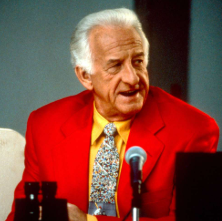
Bob Uecker’s Relationship with Players
Uecker’s unique ability to connect with players made him more than just a broadcaster.2
His previous experience as a major league catcher gave him insight into the game and created a natural camaraderie with the Brewers’ players.
Willy Adames, who played for the Brewers from 2021 to 2024, was one of the many players who shared a close bond with Uecker.
Their connection exemplifies how Uecker went beyond his role as a commentator, becoming a trusted figure and friend to those in the clubhouse.
Uecker’s Unforgettable Broadcasting Career
Bob Uecker’s tenure as a broadcaster was nothing short of legendary. He was known for his comedic timing and his ability to bring lightheartedness to even the most intense moments of the game.
Uecker’s commentary wasn’t just about play-by-play coverage—it was about storytelling, humor, and bringing fans closer to the game they loved.
His wit earned him the facetious title of “Mr. Baseball,” bestowed upon him by Johnny Carson. Uecker frequently appeared on Carson’s show during the 1970s and 80s, further cementing his place as a cultural icon.
His humor transcended the sport, making him a beloved figure even among those who weren’t avid baseball fans.
Beyond the Diamond: Uecker’s Foray into Acting
While Bob Uecker is best known for his broadcasting career, he also made a name for himself in the world of entertainment. His acting career included appearances in films and television shows, showcasing his versatility and charisma.
One of his most memorable roles was in the sitcom Mr. Belvedere, where he played the father of the family, George Owens. His comedic talents shone through in this role, further demonstrating his knack for entertaining audiences.
The Impact of Bob Uecker on Milwaukee
To the city of Milwaukee, Bob Uecker was more than a broadcaster—he was a symbol of pride, resilience, and humor.
His voice became synonymous with the Brewers, and his presence was a constant in the lives of fans. Whether through his commentary, his appearances at games, or his interactions with players, Uecker’s influence extended far beyond the press box.
The unveiling of the Uecker Monument in 2012 was a testament to his impact on the city and its baseball community. It wasn’t just a recognition of his career but also an acknowledgment of the joy he brought to fans over the years.
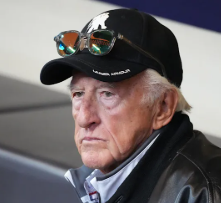
Willy Adames and Bob Uecker: Connection to Cherish
Willy Adames’ tribute to Bob Uecker highlighted the broadcaster’s ability to form genuine connections with players.3
Adames, who played four seasons with the Brewers, grew close to Uecker during his time in Milwaukee.
Their bond exemplifies how Uecker’s influence went beyond the field, leaving an emotional mark on those who had the privilege of knowing him.
Adames’ simple yet profound Instagram post showed the depth of their relationship. His words resonated with fans and players alike, reminding everyone of the personal connections that make baseball more than just a game.
Remembering the Humor of “Mr. Baseball”
- One of the defining aspects of Bob Uecker’s legacy was his humor. He had a gift for making people laugh, whether through his commentary or his television appearances.
- His ability to find humor in every situation made him a unique presence in the baseball world.
- Fans will always remember Uecker’s self-deprecating jokes, such as when he referred to his own playing career as “a great way to meet people.”
- This humor endeared him to generations of fans and made him a beloved figure in the sport.
- As the baseball world mourns Bob Uecker’s passing, his legacy continues to inspire.
- He wasn’t just a broadcaster or a former player—he was a storyteller, a comedian, and a friend to many.
- His contributions to the sport will be remembered for generations, and his impact on the city of Milwaukee will never be forgotten.
- The Uecker Monument outside American Family Field stands as a reminder of the joy and laughter he brought to countless fans.
- It’s a fitting tribute to a man who dedicated his life to baseball and left an indelible mark on the sport.
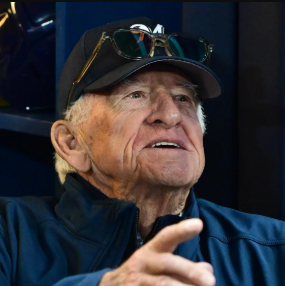
Also Read: Brent Suter (Baseball): Who Is He? Bio, Career, Personal Life, Net Worth 2024 and Childrens Book
Bob Uecker: From Backup Catcher to Broadcast Legend
Bob Uecker, a man widely celebrated for his witty commentary and iconic voice as a broadcaster, once had a lesser-known stint as a professional baseball player.
While his career as a backup catcher was far from extraordinary on the field, his charisma and humor made him a beloved figure in the clubhouse and later a cultural icon.
Uecker’s playing days provide a fascinating glimpse into a man who turned a subpar career into an extraordinary legacy.
Bob Uecker’s journey to Major League Baseball began in his hometown of Milwaukee, Wisconsin. Born on January 26, 1934, Uecker grew up watching the Milwaukee Brewers of the American Association.
His love for the game and talent as a catcher led him to sign with the Milwaukee Braves organization in 1956 as an undrafted free agent.
After years in the minors honing his skills, Uecker made his MLB debut in 1962 for the Milwaukee Braves. Playing for his hometown team was a dream come true, but Uecker quickly realized that success in the big leagues would not come easy.
As a backup catcher, he struggled to make an impact offensively, often finding himself on the bench rather than in the starting lineup.
A Nomadic Career: Trades and Transitions
- Uecker’s stint with the Milwaukee Braves lasted only two seasons before he was traded to the St. Louis Cardinals in 1963.
- Despite limited opportunities, he embraced his role as a backup and quickly became a favorite among his teammates for his humor and ability to lighten the mood.
- During his two seasons with the Cardinals, Uecker had the chance to play alongside legends like Bob Gibson and Lou Brock.
- Although his contributions on the field were minimal, his role in the clubhouse was invaluable.
- In 1964, the Cardinals won the World Series, and while Uecker’s contributions were limited, he cherished being part of such a historic achievement.
- After his time in St. Louis, Uecker was traded to the Philadelphia Phillies in 1965. Here, he struggled even more at the plate, batting below the Mendoza Line for much of his tenure.
- In 1967, he returned to the Braves organization, now based in Atlanta, where he finished his career. By the time he retired, Uecker had played in fewer than 300 games over six seasons.
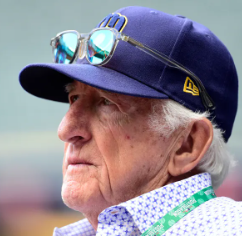
Bob Uecker’s Numbers on the Field
Bob Uecker’s playing career is often remembered for its comical lack of success at the plate.
He finished his career with a .200 batting average, 14 home runs, and 74 RBIs. His on-base percentage (.298) and slugging percentage (.287) reflected his struggles as a hitter.
His OPS+ (on-base plus slugging adjusted for the league average) was a mere 63, well below the league average of 100.
Despite his offensive woes, Uecker was considered a capable defensive catcher. His ability to handle pitchers and block balls in the dirt earned him respect from his teammates and coaches.
However, his defensive skills were not enough to make up for his lack of offense, relegating him to a backup role throughout his career.
The Humorist in the Clubhouse
While Uecker’s on-field performance was lackluster, his presence in the clubhouse was anything but. Known for his quick wit and self-deprecating humor, he kept his teammates entertained during the long and grueling baseball season.
One of Uecker’s most famous lines about his playing career was, “I hit a home run in batting practice once and was given a standing ovation. It was during a game.” He often joked about his limited playing time, saying, “I knew when my name was in the lineup, it meant two things: the star player needed rest, and the team wasn’t trying to win that day.”
Uecker’s humor extended beyond his teammates to the media and fans, quickly establishing him as a fan favorite despite his struggles on the field.
Also Read: What Is Paige Buechele Ethnicity? Meet Her Parents And Siblings & Family Details
